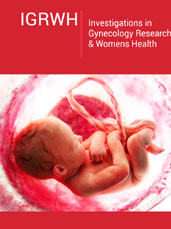- Submissions

Abstract
Investigations in Gynecology Research & Womens Health
Chronic Endometritis: Prevalence-using Hysteroscopy and Cd138 Immunohistochemistryand Impact on Reproductive Outcome in Patients with Previous IVF/ICSI Failure
-
Open or Close Mahmoud HM* and Hebisha SA
Department of Obstetrics/Gynecology, Faculty of Medicine, University of Alexandria, Egypt
*Corresponding author: Mahmoud HM, Department of Obstetrics/Gynecology, Faculty of Medicine, University of Alexandria, Egypt
Submission: June 26, 2019;Published: June 15, 2019

ISSN: 2577-2015Volume3 Issue1
Abstract
Background: A healthy receptive endometrium is essential for embryo implantation. Recently, the relationship between chronic endometritis (CE) and infertility-related conditions such as previous implantation failure has emerged as an area of inquiry.
Objective: To evaluate the prevalence of CE in women with previous IVF/ICSI failure using hysteroscopy and CD138 immunohistochemistry and to determine whether subsequent antibiotic treatment positively impacts outcome in these cases.
Design: prospective cohort study.
Setting: El-Shat by Maternity University Hospital.
Materials and methods: 145 women with history of previous IVF/ICSI failure underwent hysteroscopy and endometrial sampling for CD138 immunohistochemistry detection. Patients were placed in two groups based on presence or absence of CE (group 1 and 2 respectively). Patients in group 1 underwent treatment with oral antibiotics for at least 3 weeks until repeat follicular phase biopsy showed no CE. Primary outcome was sensitivity, specificity and accuracy of hysteroscopy in relation to immunohistochemistry, (as a gold standard) in diagnosis of CE. Secondary outcomes were implantation and pregnancy rates in the post-treatment ICSI attempt.
Result: Prevalence of CE was 23.4% (34/145) using hysteroscopy and 19.3% (28/145) using immunohistochemistry (golden standard) showing 78.6%, 89.7%, and 87.5% sensitivity, specificity and accuracy respectively. Implantation rate in subsequent cycles was significantly higher in group A vs. B (35.16% vs 16.43%, p=0.001*). Group A also showed higher pregnancy rate-yet not reaching statistical significance-compared to group B (57.14% vs 34.18%, p=0.076).
Conclusion: In women with previous IVF/ICSI failure, hysteroscopy is a reliable method for diagnosing CE. The successful treatment of CE significantly improves implantation and pregnancy rates in subsequent attempts. Confirmation of cure is essential before new trials.
Keywords: Chronic endometritis; Immunohistochemistry; Hysteroscopy; IVF/ICSI outcome; Antibiotic treatment; Implantation failure
 a Creative Commons Attribution 4.0 International License. Based on a work at www.crimsonpublishers.com.
Best viewed in
a Creative Commons Attribution 4.0 International License. Based on a work at www.crimsonpublishers.com.
Best viewed in 







.jpg)






























 Editorial Board Registrations
Editorial Board Registrations Submit your Article
Submit your Article Refer a Friend
Refer a Friend Advertise With Us
Advertise With Us
.jpg)






.jpg)














.bmp)
.jpg)
.png)
.jpg)










.jpg)






.png)

.png)



.png)






